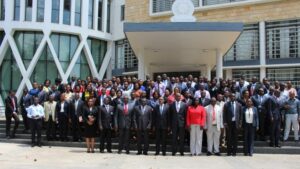Expanding Business Internationally
Regional companies find it necessary to not only compete with peer regional companies, but also well-established multinationals. Yet opportunities present themselves, not without challenges, to be explored and cultivated to expand beyond existing hard-earned markets. Simply expanding the business to sell into additional U.S. geographies or international markets might sound like an easy “fix”, but rest assured it is not likely to be that easy. Nor will success be assured!
Jumping into the international business arena is not for the faint of heart. However, to do so certainly would not suggest foolhardiness. Either the sour risk of failure or the sweet reward of success could prevail. Does your current business model have provisions to accommodate an international component? How hardy is your appetite for risk of failure? Consider the possibilities carefully and realistically.

There are many questions to be answered before entering into a new marketplace. |
Years of successful U.S. business experience partnered with a product line containing superior genetics and technology packages alone is likely to fall short as preparation for a sustained entry into the international arena. Boring into the inner core of one’s self and company perhaps would be a good first order of business. Next might be to consider the known external hurdles to be encountered. Then shift to a discovery mode to identify additional internal and external barriers. Ultimately, prepare to deal realistically with the economic feasibility aspects of potential business models that surface.
How might one identify and select a fitting global region or candidate country? Will it be a good fit with the current enterprise and worthy of in-depth investigation? What might draw you to a certain area? Could it be that a keen business sense, based on experience along with solid knowledge and sound information, suggests your product will fulfill unmet demand of an increasing middle class? Does the lure of a given people or region simply speak to you on a compassionate or romantic level? Maybe you’ve developed local contacts that appear to be “in the know” and whose assistance may provide some perceived advantage in the market? Issues such as these merit soul-searching at the very deepest personal level.
How will one go about collecting and interpreting needed in-country information about applicable governmental rules, laws, regulations, agencies and programs? Information transparency may be at a level lower than one has been accustomed to. Difference in language, social custom, cultural practice, business practice and the legal system may have to be overcome. Can an appropriate level of intellectual property rights protection be attained? Long distances and differing time zones may create challenges.
Who will conduct the due diligence investigation? It’s unlikely many could accomplish the myriad necessary tasks alone or even as a member of a U.S. experienced team. To expect the good fortune of identifying an individual having the knowledge, expertise and experience necessary to provide an accurate in-country picture set in a meaningful context for your company might be presumptuous. How many others, and in what disciplines, might be needed to help collect and interpret critical information about the country of interest? How much trust and faith need be placed in relatively new or casual acquaintances? At your inner core level, how much faith are you willing to place in others and what criteria would be used to select them? How prudent might this action be?
An often-cited hurdle, encountered when introducing new varieties or brands in non-U.S. countries, is not having a full grasp and solid understanding of applicable official variety acceptance or approval programs. Some programs may not be well coordinated with crop production or commerce cycles. Missing a simple deadline or failing to meet a vague eligibility requirement may delay the approval process. Delays could cascade over multiple sales cycles. Companies might be subject to multiple official programs as they may exist at a national, regional or local level. It is important to quickly learn which program(s) apply to given seed stock in order adjust plans accordingly. Rule waivers and exemptions to be granted simply to accommodate your business needs may be hard to come by.
Research will be required—much research! Don’t focus solely on agronomic or market development issues within the geography being studied. Study the attitudes and aptitudes present within the company today and assess whether they will be an asset or liability in the future. New questions will surface and beg answers. Prepare to receive surprises.
Take your time and consider the risks and benefits.
If the goal might be to create retail awareness and farmer demand for named varieties or branded seed products, would it be permitted in the country and would farmers be likely to accept the business model? Would a network of farmer dealers, retail outlets or lending institutions be accepted, practical and effective? What if the business plan is to simply focus on exporting seed to an in-country distributor, retailer or farmer? Might this be a better option than establishing an entirely new organization in a foreign country? What legal form of business can or should be established?
What makes a given potential market attractive? Is it presently underserved? Is it particularly lucrative? Is it growing? How large might it become over time? Might there be other new players contemplating entry into this market at this time, as are you? Will the market support you and other potential new entrants side by side with those companies already well established?
Gradually, the broad scope of the research phase will begin to narrow, thus allowing for a more refined and deep-probing final research effort. New ideas will surface. Dedicated business-planning activities can commence. Various business models will evolve and can be evaluated. Financial projections can be assembled. Economic feasibility studies can be performed.
Before launching an implementation plan, take one long final, look across the full range of reasons that seem to support a decision to delve into international business. Maintain a proper context while assessing the motivation to move forward. Fully consider the associated risks and rewards not only for the international venture but also the possible impact on the core domestic business enterprise. Consider the risks and rewards one by one. Consider them in the whole. The underlying core domestic business could become imperiled in the event the international enterprise places an overly burdensome claim on the total available human or financial capital. This could happen during a critical time in either the international or domestic business cycle.
Other things considered, how well might the key leadership team cope with the additional emotional stresses associated with a foray into the international arena? Economics and opportunity aside, is expanding business internationally really something you want to do and are capable of dealing with? It is neither for every company nor everyone.
Agriculture, particularly the seed industry segment, remains a dynamic and developing industry, ever-changing and constantly evolving. You play a vital role. Do it well!
Dennis Thompson is dedicated to delivering solutions and empowering people and organizations to solve complex problems related to international agricultural development and global food security. His career experience and international credentials include extension education, agronomy and administration.














